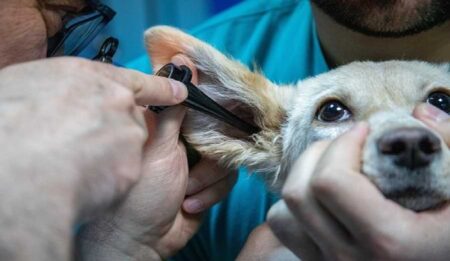It can be upsetting and worrying to be a pet owner when your dog routinely chews their tail to the point of bleeding. Dogs’ tail-chewing behavior might have a number of underlying causes, all of which need to be carefully considered and addressed. To properly treat the underlying cause, it is imperative that you comprehend the reasons behind your dog’s behavior. It might be a sign of an underlying medical condition, allergies, parasite infestations, stress or worry, or skin diseases. You can take proactive measures to relieve your dog’s discomfort and enhance their general well-being by investigating the potential causes of their tail-chewing behavior. Getting advice from a veterinarian is essential to correctly identifying the issue and creating a treatment plan that is customized to your dog’s unique requirements.
Possible Causes of Your Dog’s Tail Biting
Your dog may bite his tail for a variety of reasons, such as allergies, parasite infestations, stress, or problems with his anal glands. Extreme irritation brought on by allergic reactions to food or environmental stimulants can cause tail chewing. Ticks and fleas are examples of parasites that can irritate and pain the tail region. Dogs that bite their tails may potentially be experiencing stress or anxiety. Anal gland impaction can also result in pain or itching near the base of the tail, which might induce overeating. For your dog’s tail-biting behavior to be addressed and properly treated, it is imperative that the precise cause be found. A veterinarian’s advice can assist identify the underlying problem and offer the right course of action.
Allergic Sensitivity
Dogs that exhibit heightened sensitivity to certain allergens, such as food ingredients, pollen, or environmental conditions, are said to be allergic sensitive. This sensitivity may cause symptoms such as skin irritation, inflammation, and itching, which may incite dogs to bite their tails in an effort to ease their discomfort.
Presence of Parasites
Dogs that have parasites like fleas, ticks, or mites may experience excruciating itching and irritation. These parasite infestations in the tail region can be uncomfortable for dogs, who may bite their tails in an effort to sooth their discomfort and get rid of the parasites
Anxiety or Stress Triggers
Stress or Anxiety Dogs who are triggered may bite their tails. This behavior can be displayed by dogs in reaction to a variety of stressors, including routine disruptions, loud noises, and being apart from their masters. Dogs may use tail biting as a coping strategy to reduce tension or anxiety.
Blocked Anal Glands
In dogs, clogged anal glands can cause soreness or discomfort near the base of the tail. This disorder is brought on by an accumulation and inflammation that arises from the anal glands’ improper emptying. Dogs who have blocked anal glands may bite their tails to relieve the pain.
Strategies to Prevent Your Dog’s Tail Biting
There are a few tactics you can use to stop your dog from biting his tail. To start with, provide your dog consolation and assurance to help reduce any underlying stress or anxiety triggers. Providing interactive toys or indulging in mentally stimulating activities for your dog can aid in diverting their focus from biting their tail. It is imperative to get veterinarian care in order to address any underlying medical conditions that may be causing the behavior. Moreover, biting can be discouraged by putting on Elizabethan collars or other physical barriers that block access to the tail. By using these techniques consistently and patiently, you may effectively avoid and regulate your dog’s tail-biting tendency.
Provide Comfort to Your Dog
In order to stop your dog from biting his tail, you must first console him. Create a secure and comforting environment, refrain from reprimanding or punishing, and reassure them gently with pats and comforting words. You may ease your dog’s anxiety and lessen the chance of tail-biting by demonstrating empathy and compassion.
Offer Interactive Toys
Provide engaging toys to your dog to stimulate his mind and body. By stimulating your dog’s senses and keeping them busy, these toys help prevent boredom and the possibility of tail-biting behavior. To pique your dog’s curiosity and offer enrichment, use toys that involve problem-solving or deliver treats.
Seek Veterinary Care
It is imperative that you speak with a veterinarian if your dog bites its tail. A veterinarian can evaluate your dog’s health, identify any underlying conditions causing the behavior, and suggest the best course of action. Resolving health issues as soon as possible might reduce discomfort and stop more tail biting.
Consider Using Elizabethan Collars
If your dog bites their tail, you might want to think about getting them an Elizabethan collar. Cones or the “cone of shame,” as these collars are frequently called, physically enclose the tail and limit access. By doing this, tail biting may be deterred, and any wounds or injuries on the tail can heal naturally.
Conclusion
Successful intervention requires an awareness of the reasons behind your dog’s tail-biting behavior. Whether the cause is stress, allergies, parasites, or something else entirely, treating the underlying cause is crucial to avoiding more damage. Using Elizabethan collars, comforting your dog, getting veterinarian attention, and providing stimulating toys are all useful methods to help your dog stop chewing his tail. While putting these precautions into practice, keep in mind to be patient and consistent and to put your dog’s welfare first at all times. You can provide your pet the care and attention they need to live a happy, healthier life without having to bite their tail.








